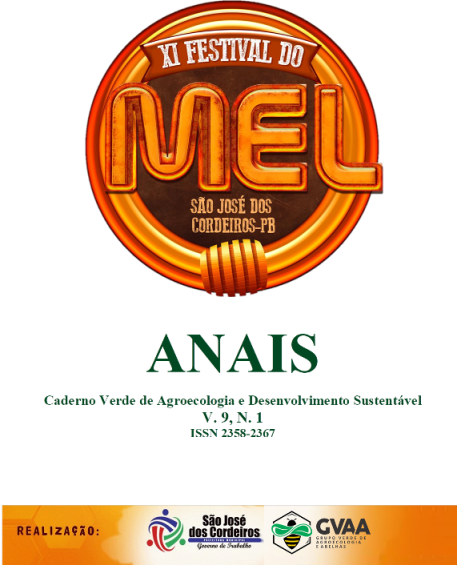NATIVE BEE HONEY AS A PHYTOTHERAPIC AND/OR FOOD PRODUCT IN THE REGION OF CARIBRI PARAIBANO, BRAZIL
Keywords:
Honey, Food, Herbal medicine, Native beesAbstract
The honey of native bees is known as a natural food that presents phytotherapic properties very well known by folk medicine due to its bactericidal properties, antiseptic, expectorants, antrheumatic, antioxidants, laxative and other. For this reason, most people use honey of stingless bees (ASF) only for therapeutic purpose, and not in function of their nutritional attributes. In addition to the medicinal properties, the ASF honey also has: organic acids, flavonoids, hormones, enzymes, water, minerals, vitamins, glucose, fructose and sucrose, that is, it is a rich energetic food source. Anyway, honey is important for both health and food! In addition, despite all these benefits, the consumption of honey per inhabitant in Brazil is still very low. This study aimed to analyze the perception of consumers regarding the purpose of the use of ASF honey, either in the food, medicinal or both forms. Data collection took place on August 10, 2019 based on the completion of a small questionnaire, which was applied to the target audience of 20 people in the free market of Sumé – Paraíba state, Brazil. During the interview, the objectives of the study were explained to the interviewees of whom seventeen were men and five women, consumers of ASF honey, in an age range ranging from 15 to 54 years. Of the interviewees, 13 people reported using honey only in the treatment of diseases; two use in feed; and five affirmed to use honey both therapeutically and in food. According to the interviewees, the most used honey is the Partamona cupira species that acts mainly in the healing of throat and flu infections. With these results, it is concluded that most of the interviewees believe that ASF honey has no other purpose besides the use for medicinal purposes.Downloads
Published
How to Cite
Issue
Section
License
Termo de cessão de direitos autorias
Esta é uma revista de acesso livre, em que, utiliza o termo de cessão seguindo a lei nº 9.610/1998, que altera, atualiza e consolida a legislação sobre direitos autorais no Brasil.
O(s) autor(es) doravante designado(s) CEDENTE, por meio desta, publica a OBRA no Caderno Verde de Agroecologia e Desenvolvimento Sustentável, representada pelo Grupo Verde de Agroecologia e Abelhas (GVAA), estabelecida na Rua Vicente Alves da Silva, 101, Bairro Petrópolis, Cidade de Pombal, Paraíba, Brasil. Caixa Postal 54 CEP 58840-000 doravante designada CESSIONÁRIA, nas condições descritas a seguir:
O CEDENTE declara que é (são) autor(es) e titular(es) da propriedade dos direitos autorais da OBRA submetida.
O CEDENTE declara que a OBRA não infringe direitos autorais e/ou outros direitos de propriedade de terceiros, que a divulgação de imagens (caso as mesmas existam) foi autorizada e que assume integral responsabilidade moral e/ou patrimonial, pelo seu conteúdo, perante terceiros.
O CEDENTE mantêm os direitos autorais e concedem à revista o direito de divulgação da OBRA, com o trabalho simultaneamente licenciado sob a Licença Creative Commons do tipo atribuição CC-BY.
O CEDENTE têm autorização para distribuição não-exclusiva da versão do trabalho publicada nesta revista.
O CEDENTE têm permissão e são estimulados a publicar e distribuir seu trabalho online (ex.: em repositórios institucionais ou na sua página pessoal) a qualquer ponto antes ou durante o processo editorial, já que isso pode gerar alterações produtivas, bem como aumentar o impacto e a citação do trabalho publicado.








